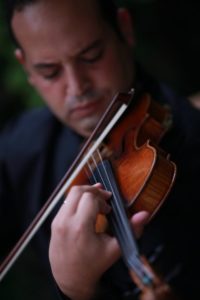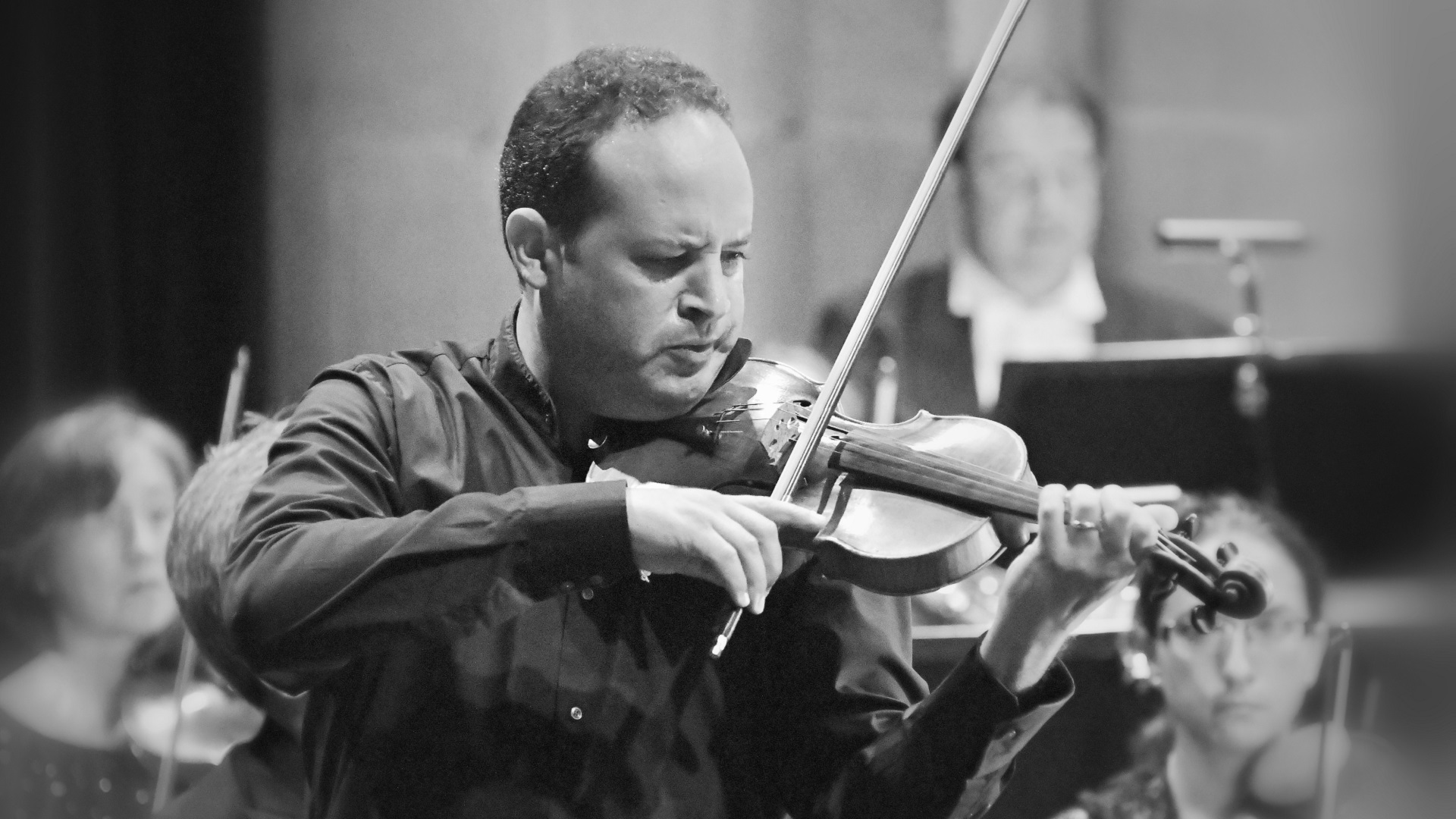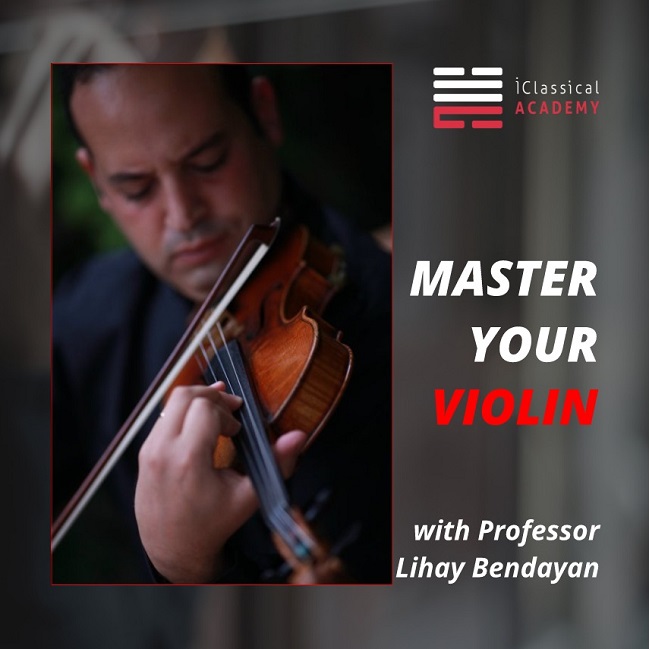Embrace your Stage Fright, practice your performance!
By Prof. Lihay Bendayan
Head of the Violin Class, Jerusalem Academy of Music and Dance

Performance Anxiety
Performance anxiety may seem like an undesired partner in our lives as musicians performing live on stage. We might view stagefright as an inevitable part of the “job” or a constant factor to contend with during the long journey to becoming a professional concert musician. Consider the fact that we work very hard for only "one shot" in front of the public. Yet, the fact is that music only lives through time - and there is no guarantee of success for the notes that follow. These circumstances are only two of the many good reasons, which might explain why stage fright seems so omnipresent.
In the complex process of forming bright violinists, I always find it interesting to observe how a small range of physical symptoms common to most humans in stressful situations - cold and/or sweaty hands, a racing heart, a dry mouth - can diminish the quality of their musical performances in so many ways, from memory lapses to shaky hands (and shaky sound), intonation accidents, difficulties in shifting, difficulties controlling rhythms and tempi, problems with expressiveness, difficulties hearing or listening to the accompaniment and even difficulty safely holding the instrument.
The physical and psychological tensions
The range of consequences to the physical and psychological tensions is extensive, and some students might experience combinations of several symptoms simultaneously and at various levels of severity. How often have I observed that students are surprised when after a good week of solid practicing at home, they arrive for their lesson* and play...well, not as well as they had expected to play.
A demanding teacher, low self-esteem, a stage, or a jury can summon the nervousness that sometimes leads to players playing significantly below their ‘usual’ level. What are the differences between practicing and performing, and how can we practice to prepare the performance if they are two different things?
This article aims to help you better understand the mechanism of stress and provide you with some practical advice that I believe can bring concrete results.
*which I usually ask to start with performance, it basically implies no stopping whatsoever until the end of the piece or the movement.
1. Understanding the mechanism of stress**
Is fear necessarily a bad thing?
Fear triggers a release of adrenaline into the blood vessels in our body. In parallel, a more rapid heartbeat and deeper breathing elevate the amount of oxygen in our blood; this oxygen is transferred to our muscles and increases our capacity to run faster or, very quickly climb a tree if we are in danger. In fact, this fight-or-flight defense mechanism triggered by fear significantly increased our chances of survival in the unpredictable dangerous ancient world.
Nowadays, the same mechanism is triggered naturally and involuntarily when we feel we are in danger or if we feel judged. Our instinctive reactions are exactly the same when we encounter modern stressors: an exam, playing (or speaking) in front of an audience or, standing in front of an orchestra.
Therefore, when you are standing on stage, symptoms of stress will most likely be on stage with you, too. Unfortunately, attempts to prepare psychologically for a concert, with the hope of completely dispensing with stress when we get there, will often lead to an unpleasant surprise.
I believe it is a better strategy to internalize that stress will certainly be present and to prepare for it, rather than think you can close the door to it in advance. So now, when you and your symptoms of stress are on stage together, the most important thing to do is to embrace the stress - not fight it. In fact, the more you concentrate on the symptoms, on trying to reduce or control them, the more they will increase.
Remember, the symptoms are there because it is normal - not because they confirm that you are not ready enough, that you are going to have a memory lapse, that you don’t want to be on stage, or that you have been playing the instrument for twenty years just to please your mother! All of these are negative interpretations of objectively natural reactions. Our interpretations, not necessarily the symptoms themselves, become the triggers of further anxiety.
Therefore, to the extent to which you ignore and demystify those physical aspects, and rather concentrate on the music (as a good example), the more quickly the unwanted feelings and your negative perception of them will disappear.
With the addition of more and more experience on stage, the same physical symptoms which you first learn to ignore and later on to accept can finally become an important source of positive energy which you shall transform to add value to your performances. Instead of having a negative impact, this energy can become a powerful tool that might even enable you to transcend yourself and constantly elevate your capacities.
** Also see Fight-or-Flight

2. Practice the Performance
When we practice a musical piece, we mainly think in the present and backward: we have to improve the bar or notes we just played. Therefore, during that learning process, we stop very frequently to work on not perfect elements, either technically or musically. In this process - we might, for example, experiment with different fingerings or bowing, reshape the phrase, perfect the sound and the intonation, enhance the dynamics and emphasize the indications in the score.
This means that while we improve various elements and short sections of the piece we work on, in that same process, we also constantly stop the train of thought. In fact, by repeatedly and for a significant period of time, we practice against the intended capability, which is not to stop.
That is, we are working against the most fundamental principle of performance! Indeed, during a performance, we always need to think ahead, anticipate the next notes and ideas, and always keep the train of thought moving forward. We should be able to do so even if we are not happy about one detail or more in our playing.
Certainly, we should not build for ourselves the conditional reflex of stopping following a mistake or whenever we don't like something. Moreover, when we perform in front of an audience, we need to project the sound more and highlight the differences between colors and dynamics on a much larger scale than the way we usually play in our practice-room.
On stage, we need to convince and impress the audience with our interpretation. Doing this requires objective technical capabilities - which can only be developed in the context of executing them. It is logical that only by ‘playing your 100%’ you can aspire for a 110% in the next performance, but if while you practice, you only play your 70%? If you tell yourself in the practice-room you will "play it musically and with conviction only when it’s ready," then how will you be able to improve on your current 100% and elevate it to a higher standard?
In fact, practicing the performance constantly and in an organized manner may be a crucial key for building a large range of capabilities needed during your concert on stage. This is why I always ask my students to execute at least 3 performances in a row of whatever they practiced during the day, whether a whole movement, one page, or just a few lines.
It will be interesting to note that maybe 50-60% of the practiced details will actually be realized as intended during the first performance. The next performance might bring you to about 80% of your target and the third one to near 95% (which should allow you to play at about 85% for the first performance the next morning).
Given this, what result should you expect from zero performances between lessons? I personally believe that the ability to increase the quality of more and more details, from one performance to the next one, without practicing between them, is in fact developing the capacity to concentrate, think ahead, and produce more in the present - the very skill you need when you perform on stage.
Several consecutive performances will also develop a "helicopter view" of the piece. By this, I mean that you are not only looking at your own feet (in the worse case) or the road in front of you (in a better one) but instead looking at the map from above, which allows a better understanding of the musical structure of the piece and therefore provides a better perspective of the musical ideas and emotions which are involved in it.
We can look at it from another angle: the first 'go' in a new swimming pool is very different from the perspective of one single 'go' after 20 laps in the same pool. It is the same for a musical piece, which might begin to feel shorter and less challenging the more you repeat it.
This phenomenon is heightened when several performances of the same piece are executed in front of a larger public when concentration levels are naturally extremely high.
Conclusion
Practice in front of a cactus
Practicing and performing can be seen as two separate elements in our everyday training and it is crucial to make sure that the first one is indeed serving the second one well. One of my eminent teachers, the Hungarian virtuoso Tibor Varga, once told me that when he was a young boy he used to perform his repertoire daily in front of his cactus (which according to him represented the musical critics).
I personally think this is indeed a great idea if no other options or persons around you are available. In parallel, understanding that fear should not be feared is crucial as well because the internalization of this notion can dramatically reduce the impact of stress on your ongoing performance.
Perform during your practice
The next step should be to extend this performance attitude to your etudes or caprices, your exercises, and even scales; rather than just practicing them. In this way, not only will you take more benefit out of them for sure, but also this means that every minute you spend with your instrument is preparing you for the moment when you will play on stage.
I learned foundations for this idea from another eminent teacher with whom I had the privilege to study, the legendary Ilona Feher. I remember very well my lessons with her at a very young age (I studied with her from the age of 9 to almost the age of 13 following Issac Stern's recommendation) and how at the beginning of each and every twice-weekly lesson, I had to perform perfectly a complete-scale by Carl Flesch, including the scales and variations on each string and different variations of bow strokes (staccato, spiccato and saltato) on the 4-octave scales, double-stops, and harmonics.
Only if the scales were performed perfectly (no other option really) did I gain the "right" to perform etudes or caprices, and if these were perfectly executed, I finally was allowed to perform some repertoire which Feher used to call "the icing on the cake". Naturally, this principle of always performing during your practicing time is complementary to the need to perform as much as possible in front of a real audience - and the level of exposure to a larger public should develop gradually.
It is widely said that in order to be completely free from stagefright, you need to play on stage at least once a week - so now you know what you should do!

Lihay Bendayan, Professor of violin and chamber music, Head of the Violin Class at the Jerusalem Academy of Music and Dance. He previously and for many years held the position of Professor of violin at the HEMU - the Lausanne University of Music, site of Sion.
After starting his violin studies with Michael Gaisler in Israel at the age of 5, at the age of 9 Lihay performed to Isaac Stern who recommended him to the legendary Ilona Feher, with whom he studied until the age of 13. He later studied with Prof. Yair Kless in Israel, Prof. Rodney Friend in London, with french violinist Jean-Pierre Wallez in Geneva, with the Hungarian virtuoso Tibor Varga in Switzerland, and with the American prodigy Miriam Solovieff, in Paris. More
Master your Violin Course with Professor Lihay Bendayan
Master Teacher Lihay Bendayan
Language English
Description of the course: Become a true Master of the Violin! This course is divided into 7 Chapters, including 5 high-precision technical in-depth articles and 24 video lessons with close-up demonstrations of practicing methods techniques.

